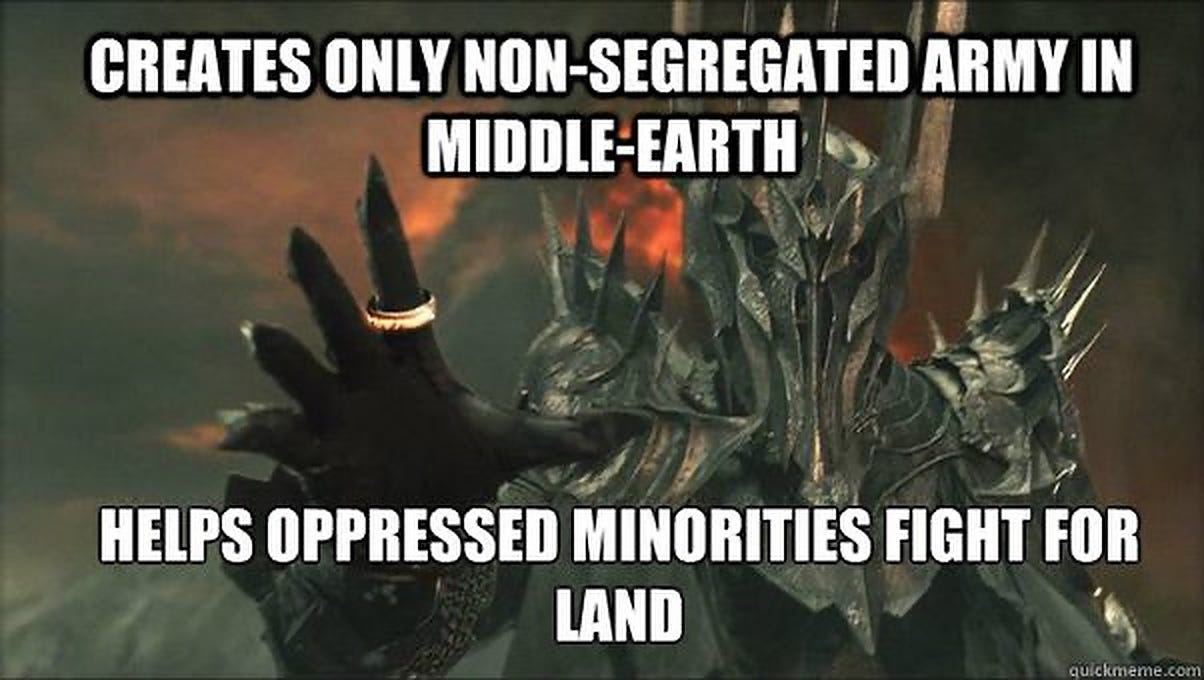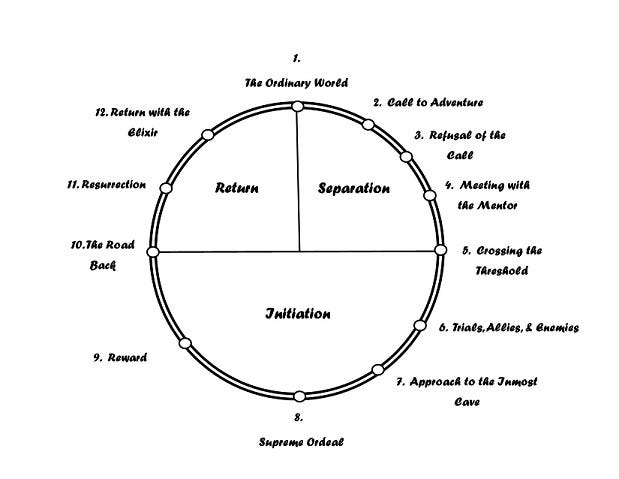How The Hero’s Journey Is Totalitarian

Years of movies have primed people to think that you can save the world by finding the right button and just pushing it. Or finding the bad guy and murdering him. Batman, James Bond, the Avengers, Lord of the Rings, Star Wars, every blockbuster really.
But the world doesn’t work that way. To ‘save’ the world the world has to change, it’s not a voyage of personal discovery. Power relations have to change, usually violently. Basically, you have to root for the bad guys, the ones trying to make a change.
This is fundamentally not what heroes do. Heroes can go anywhere and do anything—they can even have superpowers—but they must fly in a loop. They must return to where they start. This is literally the hero’s journey, and it dominates imperial art. So let us look through the fever dreams of late capitalism (movies) to see what they say about its heart.
The Hero’s Journey

Almost every adventure film is oriented around what Joseph Campbell called the hero’s journey. This narrative form is so common that we think it’s the only one.
Lord Of The Rings
Take Lord Of The Rings, for example, dude is chilling in the Shire, things get all fucked up, he goes on a hero’s journey, then he throws the Ring in the bin and is back to chilling in the Shire again. It’s the classic narrative arc.
In LOTR only the ‘Dark’ Lord Sauron is trying to change the world. Meanwhile a cartel of the most powerful people in Middle Earth gather to resist him, using a weaponized Hobbit to protect their privileges. A lot happens in LOTR, but nothing changes. Frodo walks a lot but the place stays the same, with the same people in charge.
Star Wars
A weirder example is Star Wars. Star Wars seems like it’s about rebellion against Empire, and sorta was, but now it has become a part of the Disney empire in real life. Disney doesn’t want the (Galactic) Empire to die because that would stop the show. So now the Empire is basically eternal, at least until the copyright runs out.
So today my younger cousins have pictures of Stormtroopers on their wall. Families dress up as the neo-Nazi ‘First Order’ on Disney’s Galactic Starcruiser.Whatever commentary George Lucas was trying to make about Nazis 50 years ago has morphed into ‘Nazis are cool’.
Within this empire within an empire, heroes go on journeys but the Empire is always, always preserved. On the Galactic Cruiser you can cosplay as either the Empire or Rebellion, it’s irrelevant really. You can be the hero in the hero’s journey yourself, to see how pointless it all is. Both the Galactic Empire and Disney Empire stay the same no matter what.
Avengers
Avengers is perhaps the preminent packaging of the hero’s journey into the military-industrial complex. Anytime anyone tries to change anything in the world—like to achieve world peace like Ultron, or planetary balance like Thanos—they get violently shut down. The very concept of change gets vilified and punched in the face for hours.
The crazy thing about superheroes is that they’re always cancelled out. They never actually improve or even change the world as we know it. They’re always just fighting some supervillain. Heroes and villains cancel each other out. The ordinary world is preserved as before. This is the rhythm behind every blockbuster. Individuals go on journeys. Societies do not. Indeed, anyone trying to change the world is the enemy, and must be stomped on.
What we have here, common to the hero’s journey, is that the collective journey must be crushed. An individual can take a journey, but only as long as they end up in the same place. The place cannot change. It’s a fundamentally conservative attitude. You can smash the furniture of course, even destroy Manhattan, but the power structures must be untouched. This is the lesson of the modern world, and it is told and retold from the time we’re children. Things are fine, until bad guys try to change things, and it’s OK to hit them to feel fine again. It goes on and on.
And so here we are, at the actual end of the world, with no idea of how to stop it. It’s not just that we’ve lost power to elites. We’ve lost the power of imagination.We can see the end coming, and we don’t even know when to start. All we know is the endless loop of the hero’s journey. And now that illusion is coming apart.
Totalitarianism
To Hannah Arendt, this was totalitarianism. This occupation of the imagination. To Arendt, one thing that distinguished totalitarianism was its domination of thought. As I wrote earlier:
Totalitarianism is, to Hannah Arendt, someone else’s dream invading your body, until it becomes a nightmare. You wake up, screaming, because you are just one of a million heads making up the body of a real-life Leviathan.
Arendt called totalitarianism a “lying world of consistency” created for “masses who escape from disintegration and disorientation into the fictitious home of the movement.”

Like stepping into a cinema, totalitarian ideology lets you escape into a world of good and evil, and where you can be on the side of good by just cheering and clapping in the audience.
We find Nazi propaganda baffling, but then people sit in a theatre and watch ‘American Sniper’ quite happily. What’s the difference? Americans regularly watch Muslims killed and tortured. They regularly cheer on CIA agents, cops, and their own invading armies. They even went back to Vietnam and attacked it again with Rambo. This White Empire are really just Nazis that won.
Hell, even now they’re planning a movie about their ongoing crimes in Afghanistan starring Channing Tatum and Tom Hardy. They make it about heroic white saviors saving some interpreter, and never question the white supremacy that had them occupy this country at all. A monstrous war becomes a hero’s journey for two white guys.
The real experiences of millions of brown people dying and losing their homes over decades gets literally whitewashed on screen. All that’s left is a general story about good intentions, the same story America uses to sell every war. As Arendt said:
“Their art consists in using, and at the same time transcending, the elements of reality, of verifiable experiences, in the chosen fiction, and in generalizing them into regions which then are definitely removed from all possible control by individual experience. With such generalizations, totalitarian propaganda establishes a world fit to compete with the real one, whose main handicap is that it is not logical, consistent, and organized. The consistency of the fiction and strictness of the organization make it possible for the generalization eventually to survive the explosion of more specific lies.”
Afghanistan should have exploded the specific lie that America invasions are for the good, just as Vietnam should have, but they keep making the same ‘hero’s journey’ movies about their good soldiers, and that bullshit defines history more than any books. Somehow the Resistance War Against America (as they call it in Vietnam) has become about how hard it was for the fucking Americans doing the killing and they’re doing the same with Afghanistan and Iraq.
The trick is that they make hero’s journey stories about soldiers, but no individual experience can change the course of war. War is just there. You can snipe scary Muslims, or save good ones, or steal gold, but war is a constant. Americans cannot even imagine not being at war, and that’s the most totalitarian imposition of all.
They say the victors write the history, but who cares when the losers can make movies? Hence we’re bombarded with fictitious bullshit about America’s good intentions, while Vietnamese people still have real birth defects from Agent Orange.
Because that lie is preserved in culture, America’s ‘good intentions’ can be trotted out in Afghanistan, Iraq, and now Ukraine. If you point out the reality, each time you get called crazy. The fiction is much more logical, consistent, and organized. It becomes more real. Millions of people have really been killed in America’s various terror wars, but Americans don’t care. They’re just extras.
Just get Channing Tatum rescuing one Afghan and you’ve made a hero’s journey out of a genocidal war which is still starving Afghans right now. The unconscious capitalist fever dreams of American cinema create a fictitious but consistent reality where they’re still the good guys, and things just go wrong, opps. Don’t worry, Channing Tatum went back to save that interpreter, and it’s always OK to go back to war.
It’s all lies of course, but it’s much easier than acknowledging the fact that your country sucks, your military loses every war, and you’re all suckers to the military-industrial complex. No American wants to live with the reality of busting up blocks full of families, which is what they do. They want a blockbuster, which is how they experience it.
Hitler knew this great power when he commissioned a film of Triumph Of The Will. The most totalitarian space isn’t a party rally. It’s the cinema.
The Hero’s Journey And Totalitarianism
While the content of film may look like it’s about rebellion, just look at where the hero ends up. They start in an ordinary world and always return there. Almost every film from James Bond to the Avengers is about the violent preservation of order. The people trying to change society are always the bad guys, and we cheer along as they’re beaten and murdered. It’s really quite effective propaganda because it amputates the imagination.
That leads us to today, when many within White Empire can’t even imagine systemic change, only individual choices. You need to wear a mask, you need to get vaccinated. The truth is that we need to overthrow the governments that let us die, and break up the pharma monopolies that profiteered from it all. But those are things villains would do, and we’re good. So nothing happens. Americans especially continue to live in a fictitious world rather than face the ‘disintegration and disorientation’ of the real one.
And that’s how the hero’s journey feeds into totalitarianism. We live vicariously through rebels, but end up right back in imperialism. The narrative structure loops back by design, to preserve Middle Earth, or America, or even the Galactic Empire. To preserve power. And this mirrors the zero’s journey through the movie theatre. We’re free to take any journey in the cinema, but then we walk out and we’re exactly where we started.